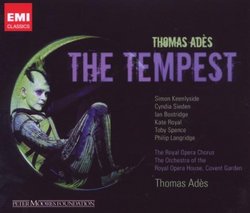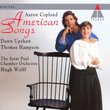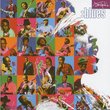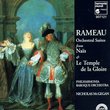| All Artists: Thomas Ades, Royal Opera House Orchestra & Chorus, Kate Royal, Ian Bostridge, Simon Keenlyside, Toby Spence, Philip Langride Title: Thomas Adès: The Tempest Members Wishing: 1 Total Copies: 0 Label: EMI Classics Original Release Date: 1/1/2009 Re-Release Date: 6/30/2009 Genre: Classical Styles: Opera & Classical Vocal, Chamber Music, Historical Periods, Classical (c.1770-1830) Number of Discs: 2 SwapaCD Credits: 2 UPCs: 400000016016, 5099969523427 |
Search - Thomas Ades, Royal Opera House Orchestra & Chorus, Kate Royal :: Thomas Adès: The Tempest
 | Thomas Ades, Royal Opera House Orchestra & Chorus, Kate Royal Thomas Adès: The Tempest Genre: Classical
|
Larger Image |
CD DetailsSimilarly Requested CDs
|
CD ReviewsOh so modern Shakespeare G P Padillo | Portland, ME United States | 08/07/2009 (5 out of 5 stars) "Ades has composed some truly wonderful music, and while there are certainly beautiful solos for all of the cast members, it is in the ensembles that his true gift shows. The writing proved both passionate and compassionate, though I feared for Miss Seiden in her exposed relentlessly high tessitura a couple of times, but she was magnificent. The final scene had me smiling through tears - which is how I like my operas to end! Ades score could not possibly more different - in every regard - from his breakthrough opera, "Powder Her Face" (which I love for entirely other reasons). I heard strong influences of Birtwistle (especially in the brass writing - some wonderful special note sliding effects that in and of itself adds an almost Shakespearean sound quality difficult to describe in words (but I know it when I hear it!). I find just a bit of amusement in that while Ades is composing music of such lyrical beauty not too many decades ago, composers like Gian Carlo Menotti were berated and raked over the coals for producing scores that didn't sound "modern enough." Things do go in cycles, don't they. During the world premiere of the work an intermission feature (which I wish were present in this recording as an "extra") I had to laugh as various members of the production team mentioned how there were no modern operatic versions of "The Tempest." "Well, Germany produced a number of attempts . . . Mozart was interested in the libretto, but never lived long enough to be able to set it." Etc., etc. I guess being on the other side of the pond, the English can be forgiven for not being aware of Lee Hoiby's glorious treatment of "The Tempest" which is enjoying a new lease on life and has recently been revived, and available in recording as well. Mr. Ades was lucky in his cast - every role seemingly written for whomever went on to sing it. This is true nowhere more than in Simon Keenlyside's powerful turn as Prospero; it is an absolutely stunning performance. Ian Bostridge, a singer I never fully warmed up to in the past, was heartbreakingly and entirely believable as Caliban. A wonderful effort and successful effort by all accounts and very highly recommended. " A theatrical hit, but the libretto is doggeral and Ades's sc Santa Fe Listener | Santa Fe, NM USA | 04/18/2010 (3 out of 5 stars) "Ades's reputation had preceded him so fulsomely that I was drawn to attend the U.S. premiere of "The Tempest" in Santa Fe, which substantially duplicated the original cast at Covent Garden, and I then followed that up by attending a revival during the recent Ades festival in London. He is the cynosure of every eye, without a doubt, attracting the cream of London singers and musicians. On both occasions the audience seemed engrossed (admittedly, the Covent Garden ticket prices were at a special huge discount). The staging in both opera houses was strikingly hyper-modern, full of gimmicks, machinery, and color. Ades's talent for theatricality seems unstinting.
The opera has a tremendous deficit in Meredith Oakes's clumsy doggerel verse libretto, which occasionally makes matters worse by referring to Shakespeare but otherwise wanders off on its own. The Hamlet of Ambroise Thomas contains attractive music and a simulation of Shakespeare's plotline. that's not enough, and yet ades relies essentially on the same strategy. Britten had the courage to set A Midsummer Night's Dream to the verse form which it cannot be severed, and The Tempest deserves the same respect. The gimmick of using a stratospheric coloratura for Ariel blotted out every word she sang, and Ian Bostridge's naked Caliban defies credibility -- has anyone ever thought that this drunken, anarchic child of nature was a lyric English tenor? It's painful to hear this great poetic creation whine, "You scorn me, you spite me, but you used to like me," to which Prospero banally replies, "Mind your place." Yipes. All of the detriments made me impatient with the opera, but I made an effort to take the music on its own terms. When embedded in a staged production, Ades's score works dramatically to paint vivid scenes. Even there, the effects are hit and miss. Propsero is given a strong line, both musically and dramatically. It's not exactly right to make him a bare-chested hunk, but oh well. Calibana's growling underpinnings in the orchestra are telling. On their own, shorn of stage action, many of Ades's musical inventions feel like time-filling, adept as they are. His great gift for orchestration never fails him. Even as the vocal line mindlessly jumps from interval to interval, the glittering accompaniments keep the ear entranced. I must say, however, that when heard nakedly, Ariel's high-flown lines are mostly irritating. In the end, this was a theater piece as much as an opera. That's a good thing, of course, but it gets more dubious when the theatrical effects are more than half the achievement. I suppose we must consign Ades's "Tempest" to the same category as the operas of Philip glass, which are unlistenable off the stage. Ades's score isn't unlistenable. It contains many striking episodes, yet I wonder how many listeners are making it form beginning to end of this recording with undiminished delight?" |

 Track Listings (16) - Disc #1
Track Listings (16) - Disc #1







